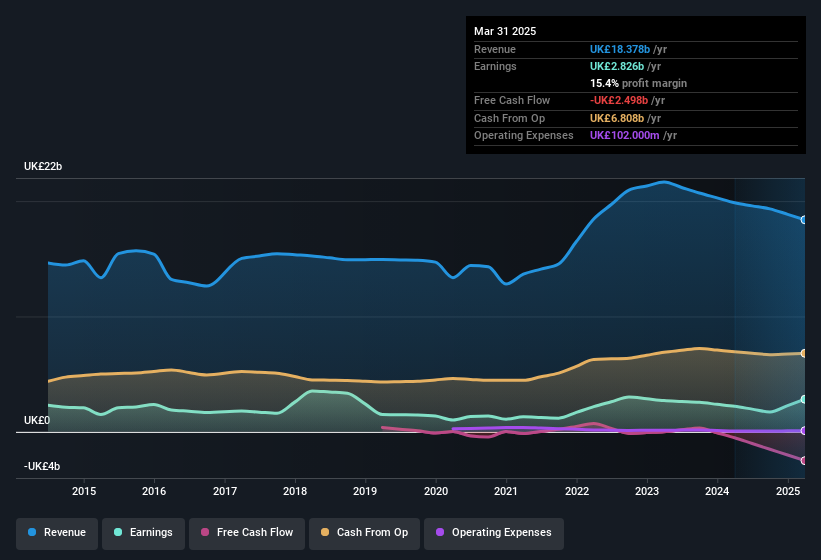- United Kingdom
- /
- Other Utilities
- /
- LSE:NG.
National Grid (LON:NG.) Strong Profits May Be Masking Some Underlying Issues
The market for National Grid plc's (LON:NG.) stock was strong after it released a healthy earnings report last week. However, we think that shareholders should be cautious as we found some worrying factors underlying the profit.
Our free stock report includes 3 warning signs investors should be aware of before investing in National Grid. Read for free now.
In order to understand the potential for per share returns, it is essential to consider how much a company is diluting shareholders. National Grid expanded the number of shares on issue by 32% over the last year. As a result, its net income is now split between a greater number of shares. Per share metrics like EPS help us understand how much actual shareholders are benefitting from the company's profits, while the net income level gives us a better view of the company's absolute size. Check out National Grid's historical EPS growth by clicking on this link.
A Look At The Impact Of National Grid's Dilution On Its Earnings Per Share (EPS)
National Grid has improved its profit over the last three years, with an annualized gain of 30% in that time. In contrast, earnings per share were actually down by 1.0% per year, in the exact same period. And at a glance the 28% gain in profit over the last year impresses. On the other hand, earnings per share are pretty much flat, over the last twelve months. Therefore, one can observe that the dilution is having a fairly profound effect on shareholder returns.
Changes in the share price do tend to reflect changes in earnings per share, in the long run. So it will certainly be a positive for shareholders if National Grid can grow EPS persistently. However, if its profit increases while its earnings per share stay flat (or even fall) then shareholders might not see much benefit. For the ordinary retail shareholder, EPS is a great measure to check your hypothetical "share" of the company's profit.
That might leave you wondering what analysts are forecasting in terms of future profitability. Luckily, you can click here to see an interactive graph depicting future profitability, based on their estimates.
Our Take On National Grid's Profit Performance
National Grid shareholders should keep in mind how many new shares it is issuing, because, dilution clearly has the power to severely impact shareholder returns. Because of this, we think that it may be that National Grid's statutory profits are better than its underlying earnings power. The good news is that its earnings per share increased slightly in the last year. The goal of this article has been to assess how well we can rely on the statutory earnings to reflect the company's potential, but there is plenty more to consider. So if you'd like to dive deeper into this stock, it's crucial to consider any risks it's facing. Case in point: We've spotted 3 warning signs for National Grid you should be mindful of and 2 of these are concerning.
This note has only looked at a single factor that sheds light on the nature of National Grid's profit. But there is always more to discover if you are capable of focussing your mind on minutiae. Some people consider a high return on equity to be a good sign of a quality business. So you may wish to see this free collection of companies boasting high return on equity, or this list of stocks with high insider ownership.
Valuation is complex, but we're here to simplify it.
Discover if National Grid might be undervalued or overvalued with our detailed analysis, featuring fair value estimates, potential risks, dividends, insider trades, and its financial condition.
Access Free AnalysisHave feedback on this article? Concerned about the content? Get in touch with us directly. Alternatively, email editorial-team (at) simplywallst.com.
This article by Simply Wall St is general in nature. We provide commentary based on historical data and analyst forecasts only using an unbiased methodology and our articles are not intended to be financial advice. It does not constitute a recommendation to buy or sell any stock, and does not take account of your objectives, or your financial situation. We aim to bring you long-term focused analysis driven by fundamental data. Note that our analysis may not factor in the latest price-sensitive company announcements or qualitative material. Simply Wall St has no position in any stocks mentioned.
About LSE:NG.
National Grid
Engages in the transmission and distribution of electricity and gas.
Solid track record and fair value.
Similar Companies
Market Insights
Community Narratives


Recently Updated Narratives


Q3 Outlook modestly optimistic


Alphabet: The Under-appreciated Compounder Hiding in Plain Sight


MINISO's fair value is projected at 26.69 with an anticipated PE ratio shift of 20x
Popular Narratives


The company that turned a verb into a global necessity and basically runs the modern internet, digital ads, smartphones, maps, and AI.


MicroVision will explode future revenue by 380.37% with a vision towards success



